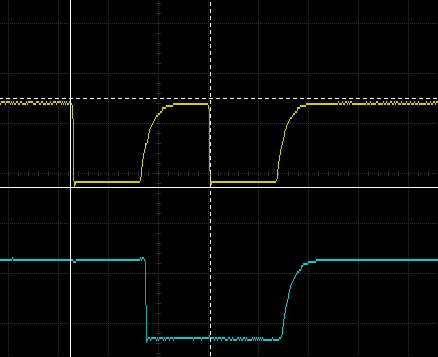-
Notifications
You must be signed in to change notification settings - Fork 13.3k
New issue
Have a question about this project? Sign up for a free GitHub account to open an issue and contact its maintainers and the community.
By clicking “Sign up for GitHub”, you agree to our terms of service and privacy statement. We’ll occasionally send you account related emails.
Already on GitHub? Sign in to your account
GPIO Timing Issues for Bit Banging, e.g., for i2c (Wire Library) #1536
Comments
|
big analyses 👍 for 5. I can give you a example #pragma GCC push_options
#pragma GCC optimize ("O0")
your code
#pragma GCC pop_optionsor void __attribute__((optimize("O0"))) foo(unsigned char data) {
// unmodifiable compiler code
}Note: the attribute make sometimes problems in gcc with function declaration, i am not sure if may try #define interrupts() xt_rsil(0)
#define noInterrupts() xt_rsil(15) |
|
Markus, thanks for that quick reply! I will try it out ASAP. |
|
I did some more tests... and it still confuses me :-/ My further observations are:
So, really strange!! wtF ... My only work around so far is, repeat the steps above until your waveforms look ok. PS: I've tried Makrus' disable Interrupt hint and the pragma style. Didn't change any noticable behaviour, or sometimes it did, but again, I think something is going a bit wrong sometimes while flashing the esp... |
|
may it has something to do with the Flash to RAM mirroring. have you tried to force all functions to RAM? void ICACHE_RAM_ATTR always_in_ram() {
}
void in_flash_and_may_mirrord_in_ram() {
} |
|
Excellent! I owe you a beer :-) So, if you are around Zurich, drop me a message! THAT DID IT! However, I have an understanding question because up to now I always thought that Functions decorated with ICACHE_FLASH_ATTR are compiled to the irom section,CPU will read the function code out of FLASH chip if needed. It will be loaded in CACHE and run only if it is called. So, it is vice versa with the arduino tool chain? i.e. if I do not put ICACHE_RAM_ATTR before functions, then they will be put into flash memory and loaded into RAM when needed? |
|
yes, on the Arduino port its the other way around, default is flash. |
I observed that sometimes the wire library did not work as expected. It is---probably---a deeper, more fundamental issue related to GPIO timing. My issue description is thus a bit longer...
Hardware Setup, Versions
I'm using an Adafruit HUZZAH (esp-12) conected to an MCP 23017, with 1.5K pullups on both lines. Then, I'm using 1.6.5-r5 of the Arduino IDE and Version 2.0 of the esp8266 board manager on Win7/64.
In order to get closer to the problem I've dedided to not use the wire library and its related cores, instead I've created a very simple basic sketch.
It contains two functions with the same functionality to toggle the two pins, written in C and Assembler,
toggle_blue_yellow__C()andtoggle_blue_yellow__asm().The pins are labeled yellow and blue to match the scope pics. The expected result would look like this:
The high and low periods are done with a simple delay loop containing some NOPs. With CPU clock of 80 MHz it should give ca. 360 KHz and with 160 MHz ca. 720 KHz---yellow line on the scope pic. I explicitly did not adapt the delay loop to the CPU clock frequency. Also, the functions in C and assembler are written to be as similar as possible.
I've tested different variations of the basic sketch:
..._160mhz_...and..._80mhz_......_dummy_...and without..._x_...For the each test I've included the rigol scope pics, the object file and a disassembly of it.
Results for C Versions
Repo-Folder
80 MHz with dummy variable,
C_dummy_80mhz.*files:First half cycle is OK. But then it should have the falling edge on the dotted position, lower pic.

But there's also a stretch on the blue one of ca. 840 nsec:
Also, I've noted that the stretching is about 2.08 usec (3.52 - 1.44):

160 MHz with dummy variable,
C_dummy_160mhz.*files:Bingo! Perfecto! :-) Correct timing, no stretching...
80 MHz without dummy variable,


C_x_80mhz.*files:First cycle is OK (ca. 370 KHz), then the low one is far too long!
160 MHz without dummy variable,


C_x_160mhz.*files:Bingo, perfecto again:
Results for Assembler Versions
Repo-Folder
80 MHz with dummy variable,


asm_dummy_80mhz.*files:Oookey, dobro :-)
160 MHz with dummy variable,

asm_dummy_160mhz.*files:Perfecto again...
80 MHz without dummy variable,


asm_x_80mhz.*files:Looks OK at first, but notice that the all cycles are too long! A half cycle is around 3.6 usec, i.e. stretched by ca. 2.2 usec (3.6 - 1.4).
160 MHz without dummy variable,


asm_x_160mhz.*files:First half cycle is OK, then stretches of again ca. 2.14 usec (2.860 - 0.72) usec:
Summary
Versions producing the expected results:
As you can see in the
inosketches I also tried to disable the interrupts (I didn't try the assemblerrsilstuff) and the watchdog, but it didn't change any of the results. Therefore, I've just commented those line out.Having a look at the dissassembly files, I could think of compiler optimizations causing these stretches of ca. 2.1 usec. However, I am bit confused that the CPU clock frequency could have impacted the results---note that the dissassembly files are identical.
My second thoughts are the issues are cauesed due to non-aligned memory access. Because, although I cannot reproduce it, there were cases, where esp-12 crashed with No 9 exception (LoadStoreAlignment Cause). But I only got the exception when there were those stretches.
Now, depending on how lucky you are, you won't face any issue with for instance the wire library. But, if you are unlucky and your compiled sketch is in one of the above bad cases, you will encounter "strange" issues with regard to i2c communication, because those stretches may introduce timing issues on SDA and SCL lines. (btw., I am aware of bus stalls but this is another topic).
My Questions...
Thanks for your thoughts, help, improvements :-)
paško
The text was updated successfully, but these errors were encountered: